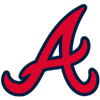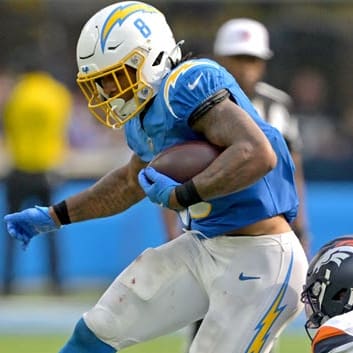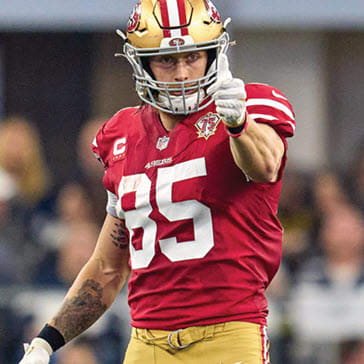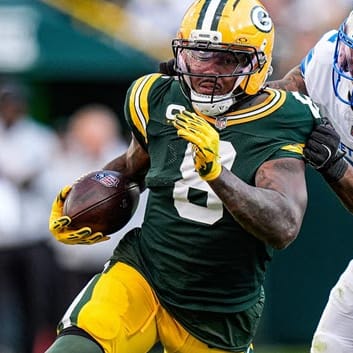Rarely does an NFL offseason feature as many fantasy stars changing teams as this year's. Baseball has its Hot Stove League; If football keeps this up, it's going to need a nickname too, especially since many of the big moves were trades, which is also a bit unusual for the NFL.
The marquee name in a new uniform is Odell Beckham Jr., whose trade to Cleveland improved the Browns offense and QB Baker Mayfield's fantasy stock. Beckham wasn't the only star player kicked to the curb, as Pittsburgh sent disgruntled wide receiver Antonio Brown to Oakland where he gets a downgrade at quarterback from Ben Roethlisberger to Derek Carr.
Speaking of the Steelers, when was the last time a team lost a top wide receiver and a top running back in the same offseason? That's what happened in Pittsburgh as running back Le'Veon Bell, after sitting out all last season, signed a four-year deal with the Jets.
Two more big-name running backs, Mark Ingram and Kareem Hunt, also signed with new teams. Ingram's arrival in Baltimore gives the Ravens an impressive one-two rushing punch when combined with quarterback Lamar Jackson. Hunt is in a different situation because of his off-field transgressions, but after he serves an eight-game suspension, he'll join Beckham in Cleveland to add even more firepower to a talented offense.
Players like Tyrell Williams, DeSean Jackson and Jordan Howard might not be fantasy stars, per se, but they too
Rarely does an NFL offseason feature as many fantasy stars changing teams as this year's. Baseball has its Hot Stove League; If football keeps this up, it's going to need a nickname too, especially since many of the big moves were trades, which is also a bit unusual for the NFL.
The marquee name in a new uniform is Odell Beckham Jr., whose trade to Cleveland improved the Browns offense and QB Baker Mayfield's fantasy stock. Beckham wasn't the only star player kicked to the curb, as Pittsburgh sent disgruntled wide receiver Antonio Brown to Oakland where he gets a downgrade at quarterback from Ben Roethlisberger to Derek Carr.
Speaking of the Steelers, when was the last time a team lost a top wide receiver and a top running back in the same offseason? That's what happened in Pittsburgh as running back Le'Veon Bell, after sitting out all last season, signed a four-year deal with the Jets.
Two more big-name running backs, Mark Ingram and Kareem Hunt, also signed with new teams. Ingram's arrival in Baltimore gives the Ravens an impressive one-two rushing punch when combined with quarterback Lamar Jackson. Hunt is in a different situation because of his off-field transgressions, but after he serves an eight-game suspension, he'll join Beckham in Cleveland to add even more firepower to a talented offense.
Players like Tyrell Williams, DeSean Jackson and Jordan Howard might not be fantasy stars, per se, but they too could make big impacts with their new teams. The fantasy landscape usually doesn't experience such seismic activity in the offseason. But that just adds to the intrigue for 2019.
QUARTERBACK
Nick Foles to Jaguars
Four Years, $88 million
Go ahead and point out the low points in his winding career, but Foles showed flashes of being special even before earning Super Bowl LII MVP honors, like during his 27-touchdown, two-interception 2013 campaign in which he became the only quarterback to simultaneously achieve a perfect passer rating and throw for seven scores in the same game. Now averaging $22 million per year (13th among QBs) with roughly $45 million guaranteed and reported incentives that can escalate his contract to more than $100 million, Foles got a less lucrative deal than what Alex Smith got from Washington last year. But, at worst, Foles is being paid like the short-term answer to Jacksonville's quarterback problem. It could even be a comfortable transition since the quarterbacks coach who helped guide Foles to 9.2 YPA during his legendary postseason run, John DeFilippo, will serve as offensive coordinator in Jacksonville. However, there are obvious concerns to be had for a quarterback's individual production on a team that intends to lean on its defense and running game.
Joe Flacco to Broncos
Traded from Ravens
The Broncos won the bidding for Flacco with a mid-round pick and can keep him on the roster the next three seasons with the option to cut him at any time without incurring dead money. They're getting a highly immobile pocket passer, but no less someone whose Super Bowl ring is proof a team can win with him under ideal circumstances. The lack of urgency in drafting Drew Lock, who fell to the second round, shows Denver truly wants to give it a go with the 11-year vet. His offensive coordinator will be ex-Kyle Shanahan and 49ers assistant Rich Scangarello, who helped coax the 10th-most passing yards the last two seasons out of a quarterback room that called on Jimmy Garoppolo, C.J. Beathard, Brian Hoyer and Nick Mullens to start at least six games each. The downside is a young group of pass catchers behind the still-rehabbing Emmanuel Sanders, though Phillip Lindsay and a solid offensive line will help.
Case Keenum to Redskins
Traded from Broncos
Unable to replicate the magic he conjured in Minnesota the season prior, Keenum saw his stats drop across the board in Denver despite having a Pro Bowl running back and a decent receiving corps at his disposal. After acquiring Flacco from Baltimore, the Broncos wasted little time shipping Keenum to Washington for a late-round draft pick, seemingly setting up the 31-year-old for an offseason battle with Colt McCoy to serve as a stop-gap starter for a team looking to rebound from Alex Smith's career-threatening leg injury. Then Washington drafted Ohio State quarterback Dwayne Haskins in the first round, and it now seems we could have a three-way battle in the works. Regardless, coach Jay Gruden seems inclined to lean on his underrated defense and well-stocked backfield, rather than putting his offense fully in the hands of someone like Keenum, who is 26-28 as a starter.
Josh Rosen to Dolphins
Traded from Cardinals
Rosen's rookie season and reputation both were sabotaged by a Cardinals offensive line that started 13 players throughout 2018. There's a reason he was the No. 10 overall pick in the draft, and it's possible Rosen could be a significant upgrade for a team that started Ryan Tannehill and Brock Osweiler last season and now has Ryan Fitzpatrick. Fitzpatrick is 50-75-1 as a starter and had to settle for backup money, so it would be a surprise if Rosen doesn't get a chance to redeem himself at some point. But even then, the Miami offense has an underwhelming corps of skill players, and the front office hasn't made much effort to deny that 2019 is about rebuilding. Finding out whether Rosen can be part of that process will be one of the team's primary goals this year.
RUNNING BACK
Le'Veon Bell to Jets
Four Years, $52.5 Million
After sitting out 2018 in protest of the franchise tag, Bell ultimately settled for a less lucrative deal than he hoped for, but one that nonetheless makes him the league's second-highest-paid running back behind Todd Gurley (in terms of average annual value). While coach Adam Gase said he will be cautious about overworking the 27-year-old, Bell should still see a high volume of touches as the offense's best weapon. Plus, he has little competition for backfield snaps; Ty Montgomery signed for the veteran's minimum, and Elijah McGuire has averaged 3.3 YPC in his two-year career. The bigger questions are rust and team context. The former is unknowable until perhaps late in preseason, but the change of scenery from Pittsburgh to New York is clearly a net downgrade.
Mark Ingram to Ravens
Three Years, $15 Million
Arguably the next best RB available in free agency after Bell, Ingram heads to Baltimore after four consecutive seasons in New Orleans with at least 4.6 YPC and six TDs. Saints coach Sean Payton said he was frustrated the move happened so quickly, perhaps because Ingram might have made more money if he'd given New Orleans a chance to match the contract. The Ravens guaranteed $6.5 million at signing, while his Saints replacement, Latavius Murray, netted $7.2 million guaranteed. Maybe the emergence of Alvin Kamara left Ingram yearning for a return to a lead role even if that meant a lesser paycheck, or maybe Ingram was intrigued by watching undrafted rookie Gus Edwards flourish alongside dual-threat QB Lamar Jackson. Either way, Ingram is well positioned to handle more than the 11.5 carries per game he had last year, leading a
Baltimore backfield that doesn't have another RB with a cap hit above $850k.
Tevin Coleman to 49ers
Two Years, $8.5 Million
After playing second fiddle to Devonta Freeman for the better part of four years, Coleman moves on to a less established backfield in San Francisco that presents Jerick McKinnon and Matt Breida as the primary competition for playing time. With McKinnon on the rebound from a torn ACL and Breida working his way back from a partially torn pectoral, Coleman might have a leg up from a health standpoint, but the elephant in the room is the massive financial commitment San Francisco made to McKinnon last season in the form of a four-year, $30 million deal. Coupled with how Breida finished last season averaging 5.3 YPC and 8.4 YPT, it's possible Coleman will be stuck in a three-way timeshare. It will be hard to sustain his to-date workload (11.1 touches per game) if he's on a team that rotates three running backs instead of two.
Latavius Murray to Saints
Four Years, $14.4 Million
Mark Ingram's departure for Baltimore created a need for a power complement to Alvin Kamara, who is yet to reach 200 carries in a season. The Saints' decision to give their new running back $7.2 million in guaranteed money suggests he'll handle a role similar to the one that saw Ingram average 84.1 scrimmage yards per game with 4.8 YPC and 19 total touchdowns in 28 appearances the last two seasons. Murray has already proven his merit as a goal-line runner, scoring 17 times on 34 attempts inside the 5-yard line the last three years between Oakland and Minnesota.
Jordan Howard to Eagles
Traded from Bears
With only one year left on his contract, the 2016 Pro Bowler was dealt for a 2020 sixth-round draft pick to an Eagles team that's had poor injury luck at running back in recent years. Howard has never lost a game to injury in the NFL, and he showed signs of his old self the final four weeks of the 2018 regular season when he averaged 88.5 scrimmage yards per game and 4.5 YPC. He has to fend off second-round draft pick Miles Sanders for the lead role, but there's touchdown and workload upside for Howard in what could be his only season with the Eagles.
Kareem Hunt to Browns
One Year, $1.1 Million
A rising Browns offense gained even more star power with the addition of Hunt, who is suspended the first eight games this season. He joins a Cleveland backfield that already included the up-and-coming Nick Chubb and underrated pass-catching back Duke Johnson. It's not clear how this backfield will operate if/when all members are eligible to play, but there would be huge potential for Hunt and his career 4.7 YPC if the injury bug were to bite Chubb during the first half of the season.
Carlos Hyde to Chiefs
One Year, $2.8 Million
Hyde just wasn't very good for either team he played on last season, running at 3.4 YPC with the Browns and 3.3 YPC after his midseason trade to the Jaguars, all while averaging 2.4 yards after contact per rush. So, pretty much, his average attempt involved getting hit around the line of scrimmage and then falling forward the length of his outstretched body. Hyde's contract includes $1.5 million guaranteed, and there's obvious touchdown upside in a Patrick Mahomes offense. It also bodes well that the Chiefs didn't feel the need to invest in a RB until the sixth round of the draft, when they added Darwin Thompson out of Utah State. Damien Williams is expected to lead the way, but his late-season 2018 breakout was preceded by four unremarkable years with the Dolphins.
WIDE RECEIVER
Odell Beckham Jr. to Browns
Traded from Giants
The league landscape significantly shifted when Beckham was dealt to a rising Cleveland team for first- and third-round picks as well as safety Jabrill Peppers. It was a significantly greater haul than what Pittsburgh got for fellow wide receiver Antonio Brown, who netted third- and fifth-rounders. While that discrepancy likely centered more around the fact that Beckham is 26 and in his prime rather than 31 and leaving it, Beckham also reached 5,000 receiving yards in a league-record 54 games and may not have even played his best football while being dragged down by Eli Manning's twilight years. Prior to a pair of injury-shortened seasons in 2017 and 2018, Beckham churned out three consecutive years with more than 90 receptions, 1,300 receiving yards and double-digit touchdowns, and he could exceed that level of production with Baker Mayfield under center this season.
Antonio Brown to Raiders
Traded from Steelers
Arguably the greatest receiver of his generation, Brown wore out his welcome in Pittsburgh after six consecutive seasons with at least 100 receptions, 1,280 receiving yards and eight scores. Flipped for third- and fifth-round picks and then signed to a three-year, $50 million deal that trails only Beckham in AAV, Brown is being paid like the difference-maker he is. Aging tends to be less a
factor for technicians like Brown than for those who rely upon raw athleticism, and the 31-year-old should continue to command a huge workload in an offense that saw Derek Carr post career highs in passing yards (4,049) and completion percentage (68.9) in his first season under coach Jon Gruden. And Carr likely will throw often this season thanks to a rebuilding Raiders defense that finished last in points allowed (29.2 per game) in 2018.
Golden Tate to Giants
Four Years, $37.5 Million
Tate's memorable run in Detroit came to a sudden halt last fall when the Lions dealt him to a playoff-minded Eagles team ahead of the trade deadline. Despite snagging at least 90 receptions in each of his previous four seasons and averaging 73.9 receiving yards over 2018's first seven games, Tate never found his footing in Philly and was allowed to walk in free agency, where he quickly latched on with the division-rival Giants to help fill an OBJ-sized void. The depth chart in New York has little at wideout besides Sterling Shepard, who at 25 was signed to a four-year, $41 million extension. Given the similarity in contracts, Tate and Shepard seem to be viewed as co-No. 1s in an offense that also wants to feed targets to RB Saquon Barkley and TE Evan Engram. In late July, Tate was suspended four games for violating league policy on performance enhancing substances. His appeal is still being considered, but he's expected to miss at least a couple games.
Tyrell Williams to Raiders
Four Years, $44.3 Million
Not a household name, Williams is nonetheless being paid as a top-20 receiver in terms of average annual salary, or at least initially, as he was only guaranteed $10 million and the Raiders easily can get out of the contract after one year. Williams has produced 9.7 YPT through four NFL seasons and finished top 15 in yards per reception each of his last three years with the Chargers, mostly filling a vertical role alongside Keenan Allen. While the switch from Philip Rivers to Derek Carr at quarterback is a significant downgrade, Williams now finds himself in an offense with fewer mouths to feed at every skill position. Antonio Brown will of course gobble up a large portion of the targets, but he'll also occupy the attention of defensive coordinators and safeties.
DeSean Jackson to Eagles
Traded from Buccaneers
It made a lot of sense in 2017 for the Bucs to combine a notorious speedster in Jackson with big-armed QB Jameis Winston and WR Mike Evans to form a potent downfield passing game. Injuries and inconsistent QB play messed up those plans, but Jackson, in his age-31 season last year, still led the league with 18.9 YPR and an 18.6 average depth of target. Upon trading for him, the Eagles wasted little time hammering out a three-year, $27.9 million deal with $15 million guaranteed. Although he'll have plenty of competition for targets in an offense with Zach Ertz and Alshon Jeffery, among others, Jackson shouldn't need too many opportunities to stay productive playing with Carson Wentz.
Jamison Crowder to Jets
Three Years, $28.5 Million
Crowder got $17 million guaranteed — including every cent of his 2019 and 2020 salaries — to be the primary slot receiver for Sam Darnold and the ascending Jets. That sort of deal all but cements Crowder's name on the depth chart the next two years, and it also suggests the market valued him more than it did Adam Humphries or Cole Beasley, who each were guaranteed at least $5 million less. However, the Jets ranked 22nd in pass attempts (524) last season, and they probably won't finish much higher after signing Le'Veon Bell and hiring a coach (Adam Gase) known for the slow pace of his offense.
Devin Funchess to Colts
One Year, $10 Million
Indianapolis paid a pretty penny for the short-term rental of a receiver who was benched by Carolina down the stretch last season. In fact, Funchess is getting a top-25 AAV among wide receivers, with reported incentives that could net him an amount equivalent to T.Y. Hilton's base earnings for 2019. However, it's fair to wonder if the 25-year-old wideout will remain in the No. 2 role all season after the Colts used a second-round pick on Parris Campbell. Furthermore, the 6-foot-4 Funchess will also have to compete with tight ends Eric Ebron and Jack Doyle for goal-line targets, though the rising tide they call Andrew Luck has the potential to lift all boats in Indianapolis after tossing 39 touchdown passes last season.
TIGHT END
Jared Cook to Saints
Two Years, $15 Million
Cook is an interesting case study, coming off a career year in his 10th pro season while playing on a dysfunctional Oakland team with a mediocre quarterback. One can knock Cook for the fact that 58 percent of his 896 receiving yards came in four games, but that sort of weekly upside — he maxed out with a nine-reception, 180-yard performance — is exactly what makes him an intriguing fit on a New Orleans team that made the 32-year-old a top-10 tight end in terms of AAV. That said, it could be hard for Cook to find consistent targets in an offense that feeds so much of its volume to Michael Thomas and Alvin Kamara.
OTHER NOTABLE MOVES
QB Tyrod Taylor to Chargers — 2Y, $11M
QB Ryan Fitzpatrick to Dolphins — 2Y, $11M
QB Blake Bortles to Rams — 1Y, $1M
QB Ryan Tannehill to Titans — traded from dolphins
RB Mike Davis to Bears — 2Y, $6M
RB T.J. Yeldon to Bills — 2Y, $3.2M
RB Frank Gore to Bills — 1Y, $2M
RB C.J. Anderson to Lions — 1Y, $1.5M
RB Spencer Ware to Colts — 1Y, $1.3M
RB Alfred Blue to Jaguars — 1Y, $895k
RB Ty Montgomery to Jets — 1Y, $895k
WR Adam Humphries to Titans — 4Y, $36M
WR Cole Beasley to Bills — 4Y, $29M
WR John Brown to Bills — 3Y, $27M
WR Cordarrelle Patterson to Bears — 2Y, $10M
WR Donte Moncrief to Steelers — 2Y, $9M
WR Randall Cobb to Cowboys — 1Y, $5M
WR Danny Amendola to Lions — 1Y, $4.5M
WR Breshad Perriman to Buccaneers — 1Y, $4M
WR Chris Conley to Jaguars — 2Y, $4.6M
WR Demaryius Thomas to Patriots — 1Y, $2.9M
WR Jordan Matthews to 49ers — 1Y, $2M
WR Seth Roberts to Ravens — 1Y, $2M
WR Dontrelle Inman to Patriots — 1Y, $1.5M
WR Chris Hogan to Panthers — 1Y, $1.5M
WR Kevin White to Cardinals — 1Y, $1.5M
TE Jesse James to Lions — 4Y, $22.6M
TE Tyler Kroft to Bills — 3Y, $18.75M
TE Dwayne Allen to Dolphins — 2Y, $6.5M
TE Ben Watson to Patriots — 1Y, $3M
TE Matt LaCosse to Patriots — 2Y, $2.8M
TE Charles Clay to Cardinals — 1Y, $2M
This article appears in the 2019 RotoWire Fantasy Football magazine. Order the magazine now.







































